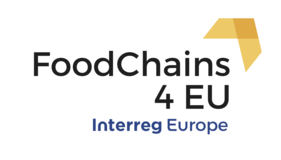Between the 30th of January and the 2nd of February 2018, the region of Greater Manchester hosted the first peer review within FoodChains 4 Europe project. The peers have been introduced into one of the topics of this evaluation: food waste, by a very successful local example: the Real Junk Food project.
Under the motto: “feed bellies not bins”, the dedicated team has summarized their lifetime work in campaigning and raising awareness to stop food waste from happening, and make the food system more sustainable and fairer for all.
The system is a perfect balance between practical action and campaigning, as one of the co-founder Corin Bell states: “We source perfectly edible food that would otherwise go to waste from supermarkets, wholesalers, and other food businesses, transform it into lovely meals, with a focus on health and nutrition, and serve them to anyone and everyone on a pay-as-you-feel basis."
The environmental context in UK is quite clear: around 15 million tons of food is wasted every year in the UK alone, and the vast majority of that food is perfectly edible, consequently around 10% of the UK’s carbon footprint comes from food that is never eaten. For every tone of food saved from going to waste, about 4.2 tons of CO2 are saved from being emitted.
The social background is however much more complex, and Real Junk Food Manchester has an innovative way to tackle it: meals are served on a pay-as-you-feel basis. Pay-as-you-feel offers an innovative, inclusive model that deliberately bucks the recent trend towards food banks. They aim to offer an inclusive space where people from all backgrounds and of any social / economic status are welcomed. Customers are invited to decide what they consider to be the value of the meal they enjoy, and to support the project with their time, energy, skills, or a financial donation if they would prefer, or are able. This is a conscious choice to work against the unfortunate consequence of a food bank model, where the poorest and most vulnerable in the UK society are segregated, often being offered little dignity or choice. Using wasted food ingredients, focusing a model on cooking and serving great meals, and offering meals on a pay-as-you-feel basis means that Real Junk Food Manchester also reverses the trend of the poorest in the society having the worst diets, and having severely limited access to healthy food. One of the highest areas of food waste, at farm, wholesale, and supermarket level, is fresh vegetables and fruits. By sourcing food that would go to waste, the project intercepts a huge quantity of basic, healthy ingredients, offering access to good food, and further bucking the trend of the most vulnerable within our society being offered heavily processed, tinned or dried meals.
Peers found this good practice example inspiring and concluded that their dignifying charity efforts and practical business model is worth being replicated at regional level.

